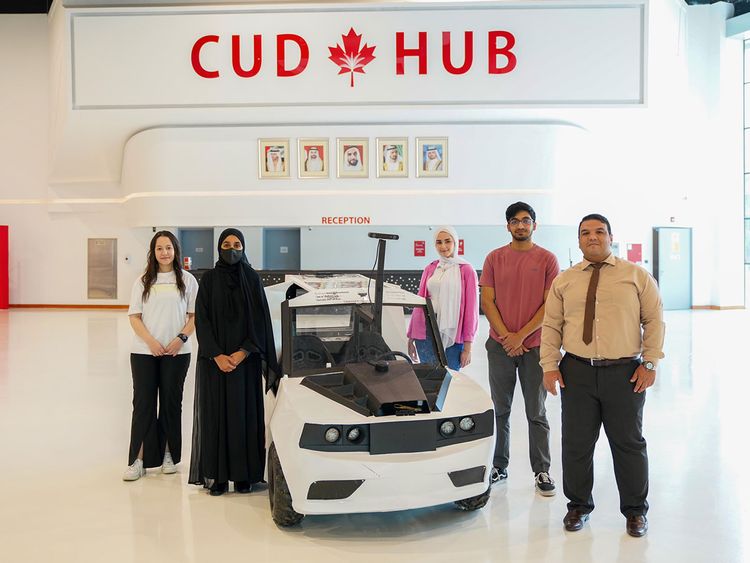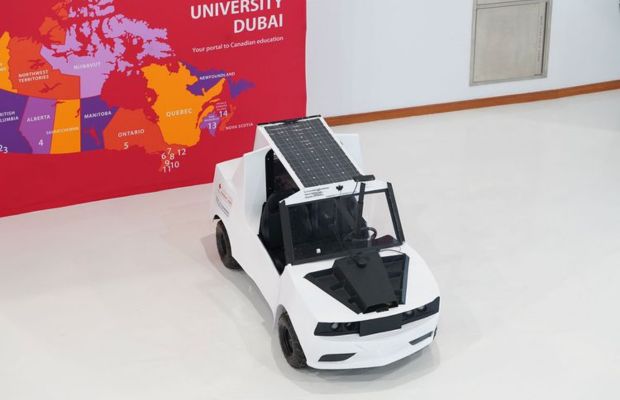United Arab Emirates aims to go carbon neutral by the mid-century with its UAE Net Zero by 2050 strategic initiative, making it one of the pioneers in the Middle East and North Africa (MENA) nations. Building upon the national goal, a group of university students in Dubai built a self-driving (autonomous) car powered exclusively by solar energy.
22 undergraduate engineering students shaping the future of urban transportation with their self-driving car. The innovative vehicle is set to revolutionize travel between CUD’s (Canadian University Dubai) City Walk campus buildings, showcasing the potential of autonomous mobility.
The CUD Autonomous Car features a 20Ah battery capacity, with a charging time of just about 22 minutes. The innovative vehicle is the culmination of a year’s worth of teamwork across a multi-disciplinary group of 22 senior students from the university’s School of Engineering, Applied Science and Technology.

A Collaborative Effort
Autonomous Car was developed as part of the graduation programme which saw five groups collaborating, each responsible for a particular aspect of the manufacturing process.
The first team engineered the steering and braking of the car, while the second team led the body shell design, material selection, and suspension system development. Third team focused on central processing design, managing controls, as well as handling the inputs received from the camera and Light Detection and Ranging (LIDAR) system sensors, which serve as the main data input for the car’s core intelligence.
The vehicle’s smart navigation, configuring the LIDAR, and camera system to ensure precise obstacle detection and avoidance were taken care of by another team.
The fifth team was responsible for the supply of power to all of the car’s onboard electronic devices, utilising the photovoltaic panel installed on the vehicle’s roof. This was achieved through a specially designed power conditioner that charges the traction battery, delivering a 60-volt power supply to the vehicle.
Speaking about the ambitious collaborative effort, Feras Ahmed Usmani, a Bachelor of Science in Electrical Engineering, Mechatronics student said: “The greatest challenge was the merging of all the systems into one cohesive car that met our project requirements.
“For example, ensuring the integration of the steering system and enabling the Central Processing Unit to receive commands from the control centres. The guidance from our professors, effective student teamwork, and strong engineering skills were fundamental to the success of all the car’s developments.”
Autonomous Rides in AUE
UAE is facilitating the entry of autonomous cars on its roads with support policies and licensing.
On July 3, the UAE Cabinet chaired by His Highness Sheikh Mohammed bin Rashid Al Maktoum, Vice-President and Prime Minister of the UAE and Ruler of Dubai, issued the first licence for self-driving vehicles to run on the country’s roads. The licence has been granted to WeRide company, which will test different types of autonomous vehicles.
A few days earlier, the Integrated Transport Centre in Abu Dhabi launched free autonomous taxi rides for Eid visitors at Saadiyat and Yas Islands. The service was offered by “Txai” which previously completed a trial phase using electric and hybrid vehicles.
Dubai’s Roads and Transport Authority (RTA) is mapping roads for self-driving taxis. IT collaborated with US company Cruise to run the maiden autonomous taxi service in the city. By 2030, RTA seeks to deploy 4,000 autonomous vehicles, making Dubai the first non-US city to commercialise Cruise self-driving cars.


